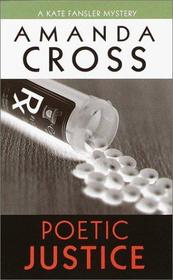Kate Fansler is an enjoyable sleuth what with her knowledge of English literature and academic politics. She and her fiancee, the DA, investiage the murder of an English professor, who is one of Kate's arch enemies.
Kate Fansler reaches Victorian literature and has a passion for the poetry of W. H. Auden -- poetry that takes on new meaning when death strikes suddenly within the hallowed halls of a great New York university. The tragedy occurs at a party celebrating Kate's engagement to assistant D. A. Reed Amhearst. It is Reed who must investigate the "accident" that looks more and more like murder -- while a suspicious amount of evidence points directly at Kate.
a simple hearache...two common asprin...and a scholars prescription for death
#3 in the Kate Fansler series: Student riots have ravaged the distinguished New York City university where Kate Fansler teaches. In the ensuing disarray, the survival of the university's plebeian stepchild, University College, seems doubtful. President Jeremiah Cudlipp is snobbishly determined to ax it; and as sycophantic professors fall in line behind him, the rally of Kate and few rebellious colleagues seems doomed. It is a fight to the death, and only a miracle-or perhaps a murder-can save their beloved institution. . .
Student riots have ravaged the distinguished New York City university where Kate Fansler teaches. In the ensuing disarray, the survival of the university's plebeian stepchild, University College, seems doubtful. President Jeremiah Cudlipp is snobbishly determined to ax it; and as sycophantic professors fall in line behind him, the rally of Kate and few rebellious colleagues seems doomed. It is a fight to the death, and only a miracle -- or perhaps a murder -- can save their beloved institution.
This novel is set during the turbulent student uprisings. Kate is charged with saving the University College, sort of like NYU's New School, primarily for adults returning to finish their education. The powers that be do not want the school to continue, the reasons are not clear. The leader of the movement is Professor Cudlipp, a stereotypical academic snob, and he is murdered. Kate and Reed are bound to find out the truth.
This is one of Amanda Cross's best, wittiest, best conceived mysteries. The characters are well drawn and three dimensional. Some of her descriptions were so true to type that I laughed until I cried. It may be her most literary novel. Each chapter is introduced by a quotation from the great English poet, W.H. Auden and Auden is present --though generally in absentia -- throughout the novel.
The mysterious death of one of the University's most bigoted faculty members (Cudlip) is presented against an accurate picture of University politics, during the Columbia student revolt of the last '60s. (The author, AKA Carolyn G. Heilbrun, is Professor Emeritus from Columbia, where she was awarded an endowed Chair in Humanities after teaching Victorian literature for many years.) Lionel Trilling, the great American literary critic and scholar appears, thinly disguised as "Frederick Cremance." Trilling/Cremance coined and popularized the expression "the life of the mind." Heinlein was one of his students, though he doubted that women were capable of having a "life of the mind." As Kate Fansler she has an opportunity to challenge him at long last. The writing is graceful, literary and tasteful.
This is one of Amanda Cross's best, wittiest, best conceived mysteries. The characters are well drawn and three dimensional. Some of her descriptions were so true to type that I laughed until I cried. It may be her most literary novel. Each chapter is introduced by a quotation from the great English poet, W.H. Auden and Auden is present --though generally in absentia -- throughout the novel.
The mysterious death of one of the University's most bigoted faculty members (Cudlip) is presented against an accurate picture of University politics, during the Columbia student revolt of the last '60s. (The author, AKA Carolyn G. Heilbrun, is Professor Emeritus from Columbia, where she was awarded an endowed Chair in Humanities after teaching Victorian literature for many years.) Lionel Trilling, the great American literary critic and scholar appears, thinly disguised as "Frederick Cremance." Trilling/Cremance coined and popularized the expression "the life of the mind." Heinlein was one of his students, though he doubted that women were capable of having a "life of the mind." As Kate Fansler she has an opportunity to challenge him at long last. The writing is graceful, literary and tasteful.




